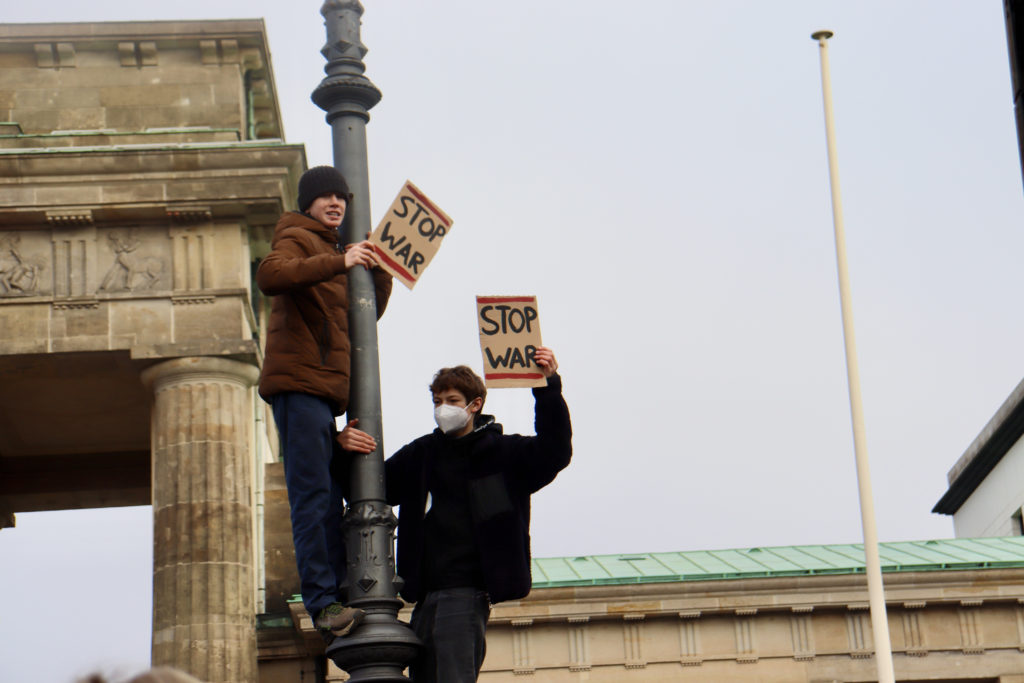Posted October 7, 2022
I was a CBYX fellow in Germany during a pretty significant time as we were the first cohort entering amidst the pandemic. My year abroad enabled me to experience futher historical world events. I wanted to share with you the few I witnessed.
To read more about my CBYX fellowship experience click here.
Climate Strike
Fridays For Future is an international climate strike movement created by the then 15 year old Swedish climate activist, Greta Thunberg. On a Friday in September, Köln among other German cities filled the streets with protesters holding cardboard signs. I was amazed by the turnout and how many people I met who were seasoned climate activists in the city. To me, it genuinely seemed like Germany was doing everything right in regards to their waste consumption.
Each house has 5 different garbage cans: plastic, compost, paper, glass (separated by color), and regular garbage. When you finish a meal in a German household, you could essentially put the dinner plates back into the cabinet because there was absolutely no food waste. Public transportation was an essential part of everyday life and many owned a bike rather than a car. There’s no plastic bags at grocery stores, and no plastic takeout culture for food/drinks in general. As someone from an insanely wasteful country, I was really struggling to understand how Germans could do more to positively impact the climate crisis. But the point wasn’t about them, it was about the corporations. They wanted companies held responsible for the waste they generated and for policies to prohibit excessive use. Germans heavily believed that when it comes to taking care of the environment, it’s a collective effort that must be practiced daily.
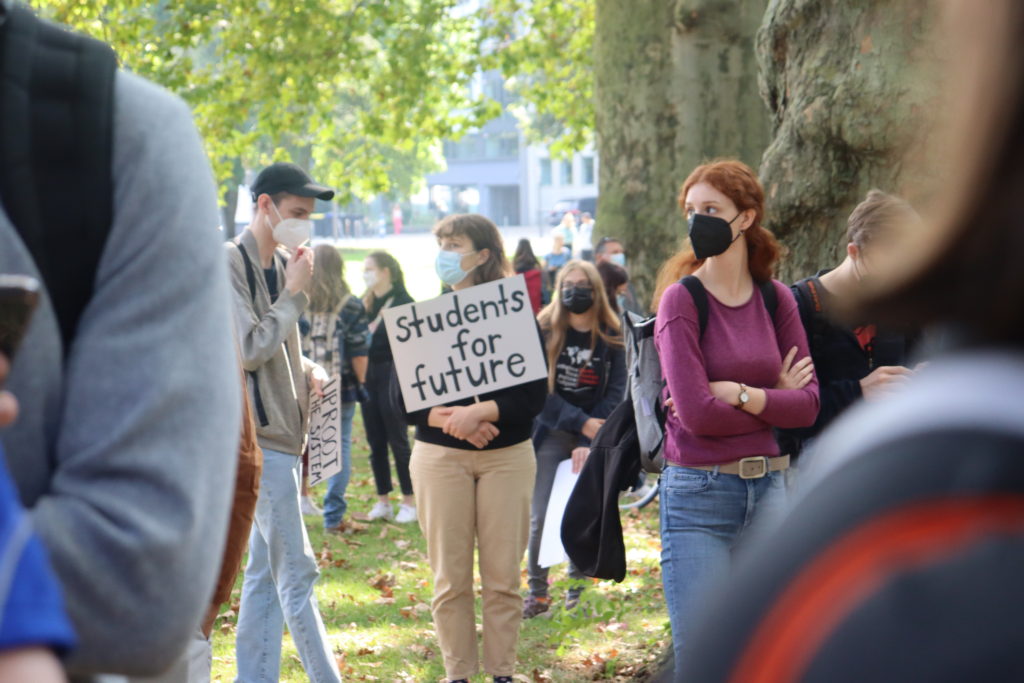
Student protester at the Köln Climate Strike 2021
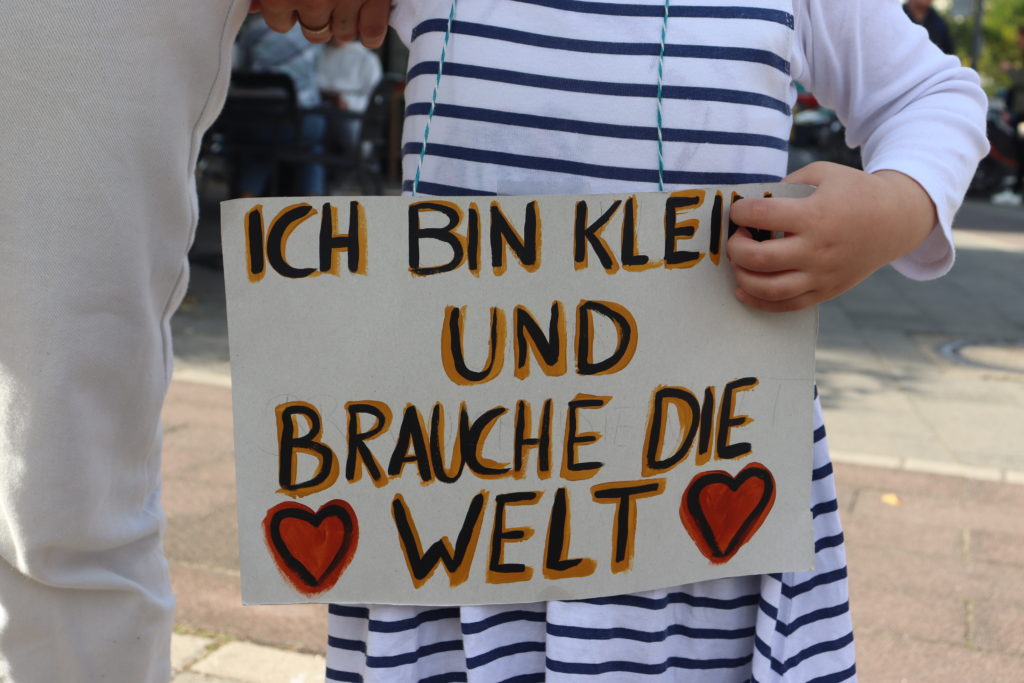
A little girl no older than 3 years old with her mom. Her sign says, “I’m little and I need the world”. This was already her third protest.
New Chancellor
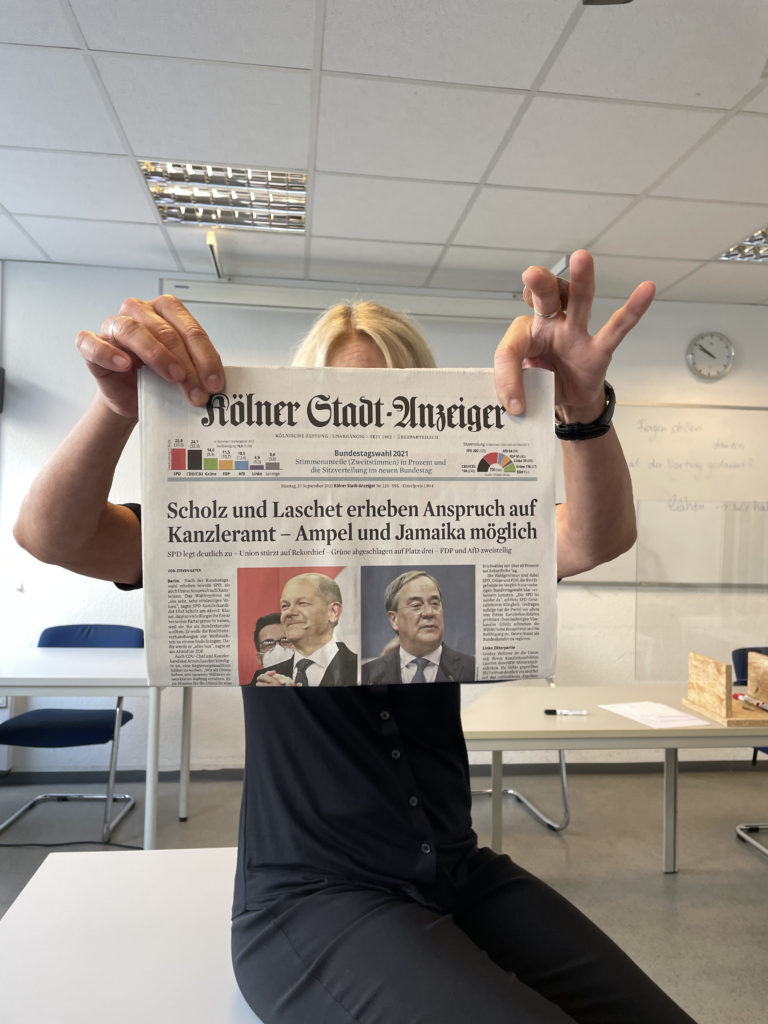
My language school teacher holding up the days newspaper, announcing Olaf Scholz and Armin Laschet competing for the Chancellor position in September 2021. Scholz was elected to Chancellor by December.
Angela Merkel, renowned Chancellor for 16 years decided to not run for another term. I learned her nickname among Germans is called ‘Mutti’ which translates to ‘mom’. People admired her and though she was part of a conservative party, she was known to be much more liberal during her time in office. During my CBYX year, I noticed that campaigning in Germany was different than the US in some key ways:
- People don’t have endorsement yard signs in front of their homes
- There wasn’t any kind of crazy fan base behind any of the candidates (minus the AFD that are similar to Trump supporters, but it’s still not as much of a spectacle)
- Rallies for candidates are held in open air with limited security
Olaf Scholz at his rally in Köln, Germany in the race for Chancellor
Ukraine War
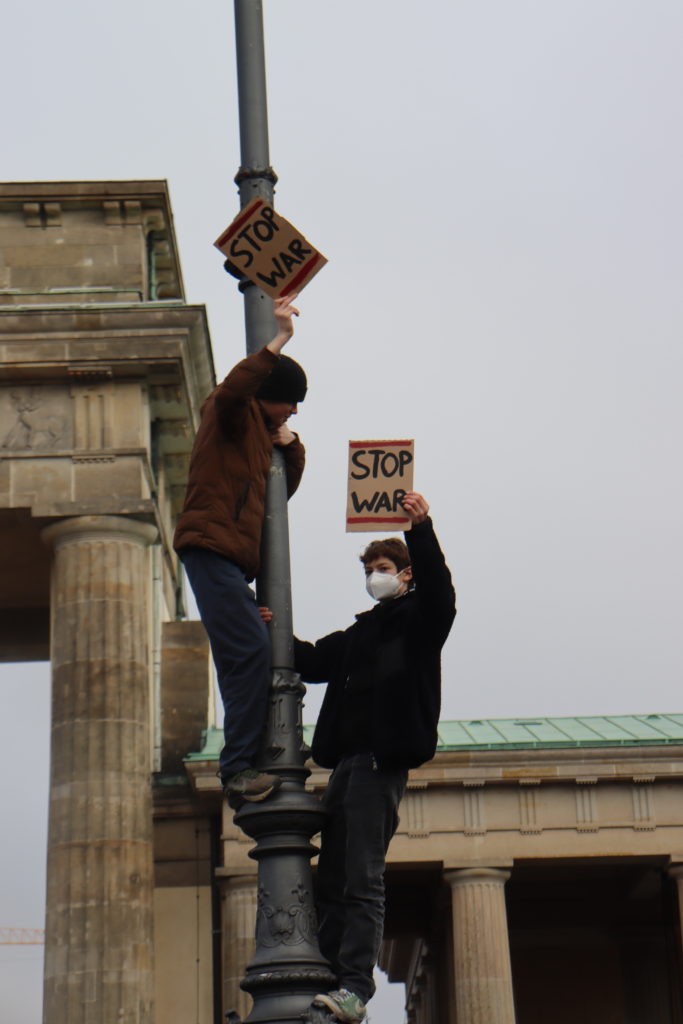
Kids climbing a street light holding anti war protest signs in Berlin, Germany
At the start of Putin’s invasion, protests immediately were underway all throughout Germany. I was visiting Berlin at the time and was able to attend the 100,000 person protest. People raised signs calling out the horrendous acts of Putin, calling for sanctions on Russia, closing ties on Russian oil and gas, and for Ukraine to never stop fighting.
A few days later, I was at the Leipzig train station when I stopped this girl wearing a reflective vest. She was part of a group of volunteers who help Ukrainians fleeing war. Volunteers help get Ukrainians to their final destination with a free ticket, take them to the refugee shelter in Leipzig or provide them with transportation to the friends or family they have in the city. This volunteer was named Anna, and she was actually a refugee from Kyiv herself who had recently arrived in Leipzig with her family. Her journey took over 14 hours by train and foot. She eventually ended up in Poland where a stranger graciously took them in for a night. From there, they made their way to Leipzig and Anna quickly began helping the other refugees making their way out of Ukraine.
Ukrainian Refugee, Anna, arrived in Leipzig with her family after fleeing Kyiv. It was her first day as a volunteer at the Leipzig train station where she provided aid and resources to the many others escaping Ukraine.
Germany and the rest of the world were in agreement that Putin’s attack on Ukraine was a senseless act of violence. In Leipzig, banners stating “no war” and “free Ukraine” were hung on nearly all businesses, and the Ukraine flag was being flown on balconies of apartments and in front of government buildings.
I have been documenting immigration for 2.5 years now and it is obvious that the response for the Ukraine refugee influx has been different. In this scenario, not a single person has been opposed to taking in refugees from Ukraine. Not even the far-right media has had any negative rhetoric towards migrants from Ukraine.
Europeans are at train stations holding signs with how many free rooms they have in their house and refugee shelters were swiftly implemented in cities. When I was coming back from the Czech Republic, volunteers were going on the trains handing out food and water to all Ukrain refugees traveling. The Deutsche Bahn train system in Germany has upheld their free ticket mandate for Ukrainians since March.
This should be the standard for all refugees, but it isn’t. And while you could argue that this crisis is different, as Ukraine is much closer and the threat of war reaching the rest of Europe is greater, it doesn’t negate the fact that there is an entire language shift to cater toward Ukrainian refugees. News reporters are saying that Ukrainian refugees are not like ‘other refugees’ and arguments that countries like Poland and Hungary once used for Syrian refugees claiming “there was no more room” in their country have completely gone out the window.
In the US, Ukrainians and Russians fleeing the violence are arriving at the port of entry in Mexico looking to seek asylum in the US. VICE news covered the arrival of refugees from Ukraine and Russia to the US-Mexico border. It documented the double standard of US border policy, showing certain asylum seekers receiving special treatment, and could jump the line, while others are forced to wait indefinitely. For refugees who have been waiting for years, it’s a disheartening feeling.
When I was in Greece, for my internship at Mission Lifeline, a team member was able to get in touch with a 19-year-old girl from Afghanistan who had been living at the camp with her family for several years. The two of them met in 2020. She tells him, that she’s grateful to hear that Ukrainian refugees receiving asylum quickly in neighboring countries, but her family has been waiting longer for that chance. She is incredibly smart, persevering and in spite of everything, remains relentlessly hopeful. She learned Greek allowing her to go to the Greek high school, is fluent in English allowing her to take up some under the table translating work when reporters come to the island. She is currently writing a book about her life journey. Now having given up trust for Greece’s asylum process, she moved her family to Germany, where she believes the chances for asylum will one day come.
Another stark double standard was something my friend Nora experienced coming home from Hamburg. One of the train crew members’ was asking surrounding passengers if anyone spoke Arabic. Nora said “I do.” The crew member explained that this single woman next to her was a refugee from Afghanistan. There was an apparent language barrier at the train station, and the woman was booked the wrong ticket to the wrong city. She didn’t have any more money for a new ticket (last minute tickets like that are usually 60 – 100 euros, if not more) and the crew member said that Nora needed to explain “that the situation is out of our hands, there’s nothing we can do.” Nothing you could do? You literally allow anyone who flashes a Ukraine passport to ride for free. She’s a refugee just like those from Ukrain, but maybe from a country, you carry no sympathy towards. Nora ended up giving her all the cash she had and so did one nice man next to her. The old trope of “in an ideal world” is only used when we deem who is ‘important enough’ to help.
A Mission Lifeline team member reconnects with a refugee girl from Afghanistan on the island of Lesvos
